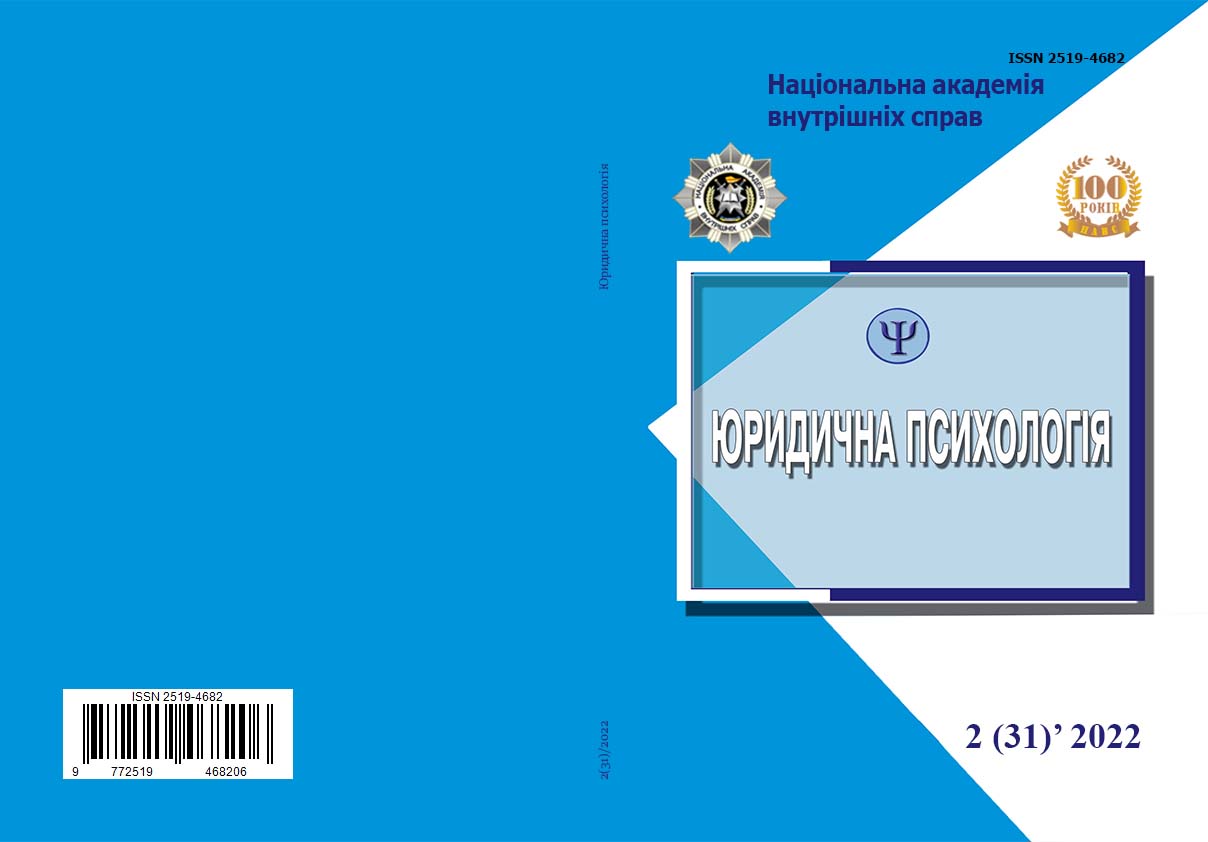Formation of Mediation Skills in Future Law Enforcement Officers
Abstract
The relevance of the study is due to the need to improve the mediation skills of law enforcement officers, which is due to the current trends of European integration processes in Ukraine. The purpose of the study is to determine the ways of formation of mediation skills in future law enforcement officers. The methodology of problem analysis consisted of the general theory of professional activity and the socio-psychological theory of communication, which is based on both differentiation and integration of existing knowledge in various fields. On this basis, the essence of mediation is determined, as a technology of alternative settlement of disputes with the participation of an impartial third party, not interested in this conflict – a mediator. Research results. The essence of the concept of mediation, its types and specifics of application in law enforcement activities are defined. The directions and methods of formation of mediation skills in the process of professional training of law enforcement officers are outlined. The content structure of the educational discipline «Mediation in law enforcement activities» is described, taking into account the specifics of the relevant field: in juvenile prevention, patrolling mass events, negotiation activities. The need to use the case method and business game in the process of modeling situations of professional interaction is substantiated. It was determined that the mediator’s professionalism is an important, but not the only, condition for obtaining a positive result in this process. Competence and experience can and should be supplemented (depending on the situation) by such non-formalized factors as leadership, authority, possession of mechanisms of socio-psychological influence, etc. The scientific novelty of the article lies in the systematization of knowledge about the general nature of mediation, as well as highlighting its specifics in law enforcement activities. The practical significance is represented by the definition of practical methods of formation of mediation skills in future law enforcement officers in the process of professional training.Keywords: law enforcement activity; mediation; communication; conflict; juvenile prevention; mass behavior; negotiation activity.
Downloads
References
Bondarenko V., Danylchenko V., Khudiakova N., Krymets, O. Methodological approaches to professional training of future patrol officers. Pedagogical Innovations: Ideas, Realities, Perspectives. 2019. No. 2. P. 80–88. DOI: 10.32405/2413-4139-2019-2-80-88.
Думко Н. В. Врахування особистісних запитів курсантів поліції на побудови власної траєкторії навчання. Наукові записки. 2021. № 145. С. 54–62. DOI: 10.31392/nz-npu-145.2019.06.
Гірняк А., Васильків О. Психологічні бар’єри у взаємодії викладача й студентів та шляхи їх ефективного подолання. Psychological Prospects Journal. 2019. № 33. С. 79–90. DOI: 10.29038/2227-1376-2019-33-79-90.
Никифорова О. Дослідження коригуючого впливу навчання на професійно важливі якості поліцейських. Наукове забезпечення технологічного прогресу XXI сторіччя. 2020. Т. 4. С. 23–25. DOI: 10.36074/01.05.2020.v4.05.
Смеречак Л. Особливості педагогічної діяльності викладача вищої школи. Молодь і ринок. 2018. № 11 (166). С. 125–129. DOI: 10.24919/2308-4634.2018.152275.
Яницька О. Ю. Психолого-педагогічні аспекти формування авторитету викладача. Психологія: Реальність і Перспективи. 2019. № 10. С. 178–182. DOI: 10.35619/prap_rv.vi10.113.
Захарченко О. Роль та значення післядипломної освіти поліцейських у підвищенні їхнього професійного рівня. Entrepreneurship, Economy and Law. 2020. № 6. С. 138–142. DOI: 10.32849/2663-5313/2020.6.24.
Wachs S., Wright M. Associations between bystanders and perpetrators of online hate: The moderating role of toxic online disinhibition. International Journal of Environmental Research and Public Health. 2018. No. 15 (9). DOI: https://doi: 10.3390/ijerph15092030
Wright M., Wachs S. Adolescents’ Cyber Victimization: The Influence of Technologies, Gender, and Gender Stereotype Traits. International Journal of Environmental Research and Public Health. 2020. No. 17 (4). DOI: https://doi:10.3390/ijerph17041293
Солдатова Г. У., Рассказова Е. И., Чигарькова С. В. Виды киберагрессии: опыт подростков и молодежи. Национальный психологический журнал. 2020. № 2 (38). С. 3–20. DOI: https://doi:10.11621/npj.2020.0201.
Ларченко М. О. Моделі залежної поведінки та пов’язані з ними фактори кримінологічного ризику. Юридичний науковий електронний журнал. № 4. 2020. С. 256–259. DOI: https://doi.org/10.32782/2524-0374/2020-4/62.
Свідовська В. Адиктивна поведінка підлітків як проблема наукового дослідження. Вісник Львівського університету. 2020. Вип. 6. С. 108–114. (Серія «Психологічні науки»). DOI: https://doi.org/10.30970/2522-1876-2020-6-16.
Безпалова О. І. Особливості впровадження практики медіації в діяльність органів поліції щодо профілактики випадків насильства у дитячому середовищі. Науковий вісник Дніпропетровського державного університету внутрішніх справ. 2019. № 2. С. 21–25. DOI: 10.31733/2078-3566-2019-2-21-25.
Клачко В. М., Костюк В. Л., Литвин В. В., Федоровська Н. В. Особливості спілкування патрульних поліції з учасниками масових акцій в конфліктних ситуаціях : метод. рек. Київ : Нац. акад. внутр. справ, 2016. 48 с.
Abstract views: 174 PDF Downloads: 157
- Authors reserve the right to authorship of their own work and transfer to the magazine the right of the first publication of this work under the terms of the Creative Commons Attribution License, which allows other persons to freely distribute published work with mandatory reference to authors of the original work and the first publication of an article in this magazine.
- Authors have the right to enter into separate additional agreements on non-exclusive dissemination of the work in the form in which it was published in the journal (for example, to post an article in the institution's repository or to publish as part of a monograph), provided that the link to the first publication of the work in this journal is maintained.
- The journal's policy allows and encourages the posting of articles by authors on the Internet (for example, in electronic storehouses of institutions or on personal websites), both before the submission of this manuscript to the editorial office and during its editorial processing, as this contributes to the creation of a productive scientific discussion and positively affects the efficiency and dynamics of citing the published work.




